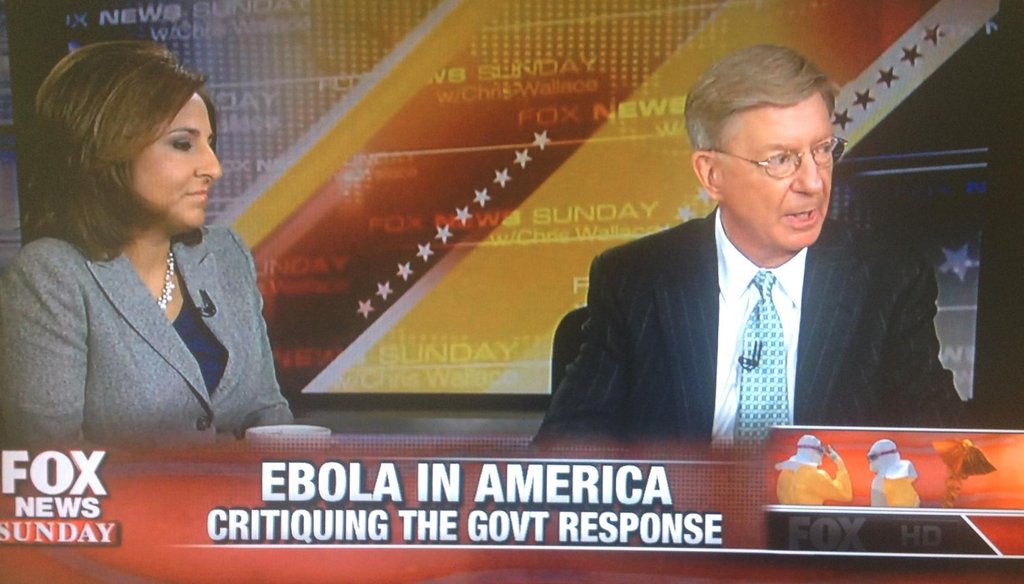Stand up for the facts!
Our only agenda is to publish the truth so you can be an informed participant in democracy.
We need your help.
I would like to contribute

George Will on "Fox News Sunday" Oct. 19, 2014.
Talk show host Tavis Smiley bemoaned politicians and the media for Ebola fear-mongering on ABC’s This Week Sunday, saying things aren’t as bad as people are claiming.
At about the same time on Fox News Sunday, conservative columnist George Will stoked panic by saying doctors now think that Ebola could spread through the air via a cough or a sneeze.
"The problem is the original assumption was -- said with great certitude if not certainty -- was that you need to have direct contact, meaning with bodily fluids from someone, because it’s not airborne," Will said. "There are now doctors who are saying we’re not so sure that it can’t be in some senses transmitted by airborne."
Will went on to say doctors believe a "sneeze or some cough" can spread Ebola.
That would indeed be scary … if it were correct.
Will’s claim rates False.
While Will did not respond to our request for an interview, he said on Fox News that his information came from scientists at the University of Minnesota.
In mid September, the University of Minnesota’s Center for Infectious Disease Research and Policy posted a commentary from two University of Illinois professors, who argued that health care workers treating patients with Ebola should wear respirators. Face masks, they said, are not enough.
We asked one of the authors, Lisa Brosseau, if Will had correctly relayed her work. Brosseau said her views had nothing to do with Ebola spreading among the public at large through a sneeze or cough. The focus was on health care workers treating people in the isolation wards.
"We were concerned about aerosols generated by infected patients in the most severe stage of the disease," Brosseau said.
As has been well documented, the first symptom of an Ebola infection is a fever. As the virus multiplies in the body, vomiting and diarrhea set in. Brosseau had written that it is possible that for patients in that condition, tiny water particles from violent vomiting and diarrhea could get into the air and be inhaled. Will had mistakenly connected the pathway of infection in a hospital room with someone coughing or sneezing circulating in public.
"We are not aware of any published data about the viability or infectiousness of the Ebola organism in aerosols in the real world," Brosseau told PunditFact. "It appears unlikely that the public will be exposed to infectious aerosols because they are not likely to encounter infected people experiencing the severe symptoms."
We found similar views in the Oxford Journal of Infectious Diseases, and summaries issued by the Centers for Disease Control , the World Health Organization and the New England Journal of Medicine.
Adam Lausing, an infectious disease researcher at the University of Michigan, emphasized that Ebola is not a respiratory disease. Coughing and sneezing are not symptoms in the way that they are with the flu.
"If someone (with Ebola) vomits up fluid, aspirates, and coughs, that could be considered ‘airborne,’ but that is very different from sitting next to someone on a plane," Lausing said.
Smiley, meanwhile, tried to tamp down fears by comparing the Ebola outbreak to the SARS outbreak of 2003.
"Context: This is not as bad as SARS was in 2003," said Smiley, referring to the outbreak of severe acute respiratory syndrome that started in Hong Kong.
Is Smiley right that SARS in 2003 was worse than today’s Ebola crisis?
Well, it depends on the context. We talked to experts and found that looking at the Ebola and SARS outbreaks in their points of origin -- West Africa and Hong Kong, respectively -- Ebola has been more destructive. SARS, on the other hand, had a wider global reach than Ebola.
"It depends on what’s your gauge for ‘worse,’ " said Laurie Garrett, a senior fellow for global health at the Council on Foreign Relations.
Several experts told us that the potential for the Ebola outbreak to grow -- and the humanitarian toll on West Africa -- makes it more dangerous.
By the numbers, Ebola is already significantly more deadly. So far, there have been more than 4,500 reported Ebola deaths. The SARS outbreak resulted in 774 deaths.
Also, there already are more Ebola cases worldwide -- 9,216 documented cases of Ebola compared to 8,096 documented SARS cases.
That said, SARS is much more communicable than Ebola, meaning it is easier to catch. It can spread through a sneeze, cough, sharing a beverage or speaking up close with someone who has the disease. It is also possible that SARS travels through the air.
Ebola, as we’ve said, is not believed to be airborne. Experts say it is only possible to get Ebola by coming into direct contact with the body fluids of someone who is sick.
In sum, SARS spread to many more countries than Ebola has so far. However, there have been more cases of Ebola, and the death toll is much higher. The Centers for Disease Control and Prevention anticipates that the number of cases in West Africa could reach the hundreds of thousands by January.
"In terms of U.S. (Ebola) cases, it is still minimal," said Dr. Howard Markel, director of the Center for the History of Medicine at the University of Michigan. "If you're in West Africa, it's a nightmare and very serious, and far more deadly already than SARS was."
We rate Smiley’s claim Mostly False.
Our Sources
See individual fact-checks.


















































